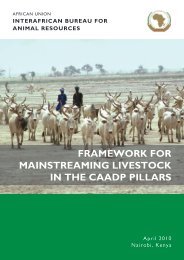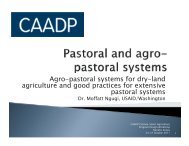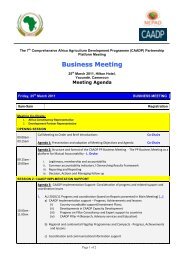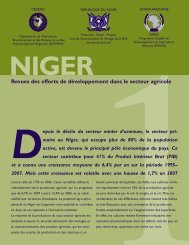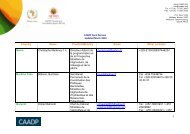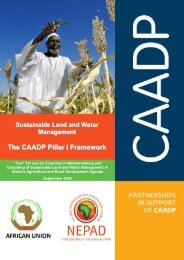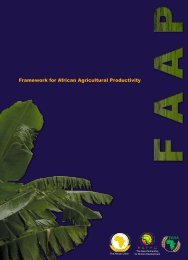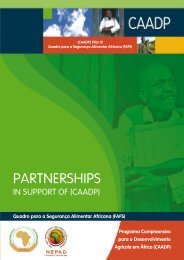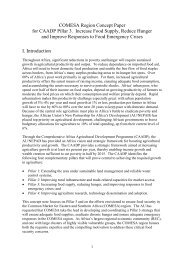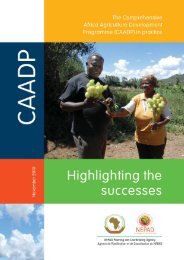The Role of Sustainable Land Management for Climate ... - CAADP
The Role of Sustainable Land Management for Climate ... - CAADP
The Role of Sustainable Land Management for Climate ... - CAADP
Create successful ePaper yourself
Turn your PDF publications into a flip-book with our unique Google optimized e-Paper software.
!<br />
important to address, so that the ultimate impacts on sustainable natural resource management<br />
and poverty reduction are as positive as possible. Given that they have comparable potential to<br />
REDD to help mitigate climate change, and probably greater potential to help improve rural<br />
livelihoods and facilitate adaptation, it is un<strong>for</strong>tunate and somewhat surprising that AFOLU<br />
activities have not received the same support in the UNFCCC process as REDD or other<br />
activities. Although there are difficult challenges and constraints that would affect the feasibility<br />
<strong>of</strong> payments <strong>for</strong> AFOLU activities, the previous discussion illustrates that these challenges are<br />
not likely to be any more difficult to address than those that face a REDD payment scheme (and<br />
in many cases may be easier to address).<br />
Active advocacy by African governments and other stakeholders concerned about SLM<br />
in SSA, including the UNCCD, <strong>CAADP</strong>, and TerrAfrica partners, will be essential to raise the<br />
pr<strong>of</strong>ile <strong>of</strong> AFOLU payments so that they receive serious consideration. To the extent that such a<br />
coalition contributes to acceptance <strong>of</strong> REDD payments, it may also receive greater cooperation<br />
and support from other stakeholders that are more focused on promoting <strong>for</strong>estry activities but<br />
haven’t yet supported including AFOLU payments in the post-Kyoto agreement. If these<br />
overlapping but somewhat distinct groups <strong>of</strong> stakeholders join <strong>for</strong>ces to effectively advocate both<br />
REDD and AFOLU payments, the chances <strong>of</strong> success <strong>for</strong> both initiatives are likely be greater.<br />
Agree to national GHG targets <strong>for</strong> developing countries and use national GHG accounting<br />
One major way to increase the contribution to climate change mitigation <strong>of</strong> farmers and other<br />
resource users in Africa and other developing regions would be <strong>for</strong> all countries, including<br />
developing countries, to agree to national GHG emission targets that are used as the basis <strong>for</strong><br />
crediting emissions reductions. Such an approach is <strong>of</strong> course already applied to Annex I<br />
countries under the Kyoto protocol. Including targets <strong>for</strong> developing countries in a post-Kyoto<br />
agreement does not imply that developing countries would have to accept binding commitments<br />
to reduce GHG emissions that could retard their development and would be unfair (considering<br />
much higher GHG emissions per capita in developed countries). Targets could be based on<br />
projected increases in GHG emissions needed to achieve sustainable development, considering<br />
population and economic growth and available technologies and capacities <strong>of</strong> each country. A<br />
“no lose” approach could be used in which developing countries are credited if they achieve<br />
reductions in emissions below their target, but are not penalized if they fail to do so. A full<br />
!<br />
))!



